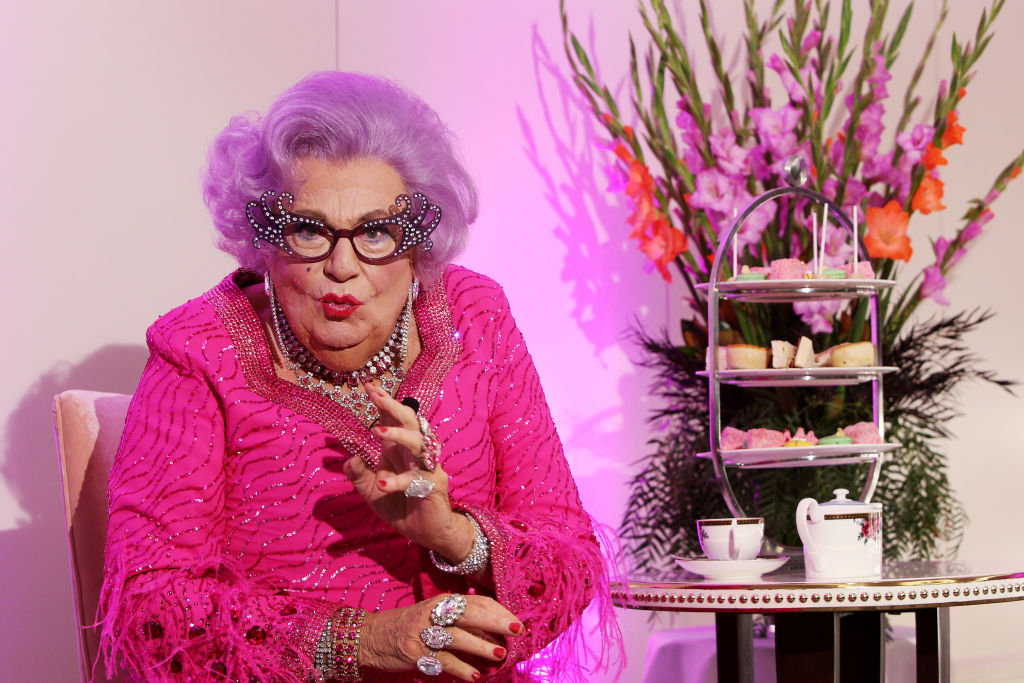It was not just Barry Humphries who died on Saturday.
It was that towering skewerer of pomposity and humbug, and gate-crasher of Royal boxes, Dame Edna Everage. It was Australia’s roving cultural attaché and Australian Minister for the Yartz, Sir Les Patterson. It was pathetic Melbourne suburban pensioner, Sandy Stone. It was colonial hellraiser Barry McKenzie. It was a host of other characters, who burst forth from Humphries’s determination to be different in a world that worshipped conformity, and his witheringly sharp eye for the absurdities of the human condition.
Like another hugely-talented man of many characters, Peter Sellers, Humphries kept the real him from most of the wider world. But Dame Edna, Sir Les, Barry McKenzie and all the rest were still Humphries. Safely hidden behind their masks, Humphries held a mirror to audiences round the world, including the cosseted, egotistical celebrities, politicians, and even royalty who dared to brave The Dame Edna Experience.
In his native Australia, and particularly his hometown of Melbourne, Humphries will be especially missed. Despite becoming a man of the world, and especially of Britain, he never lost his love for Australia and, despite his portraits of them, most Australians never lost his love for him – or, rather, for his characters who were far more of us than they were, perhaps, ever of him.
Over eighty years, from his schooldays, Humphries reflected Australia to Australians, and to the wider world. It’s no coincidence that Dame Edna and Sir Les became ever more larger presences, ever more confident, ever more brash, as the Australia for which they held transformed from the semi-colonial backwater of Humphries’s solidly middle-class suburban youth, to the influential, complex, and independent-minded nation it is as he leaves it.
Over eighty years, from his schooldays, Humphries reflected Australia to Australians, and to the wider world.
His sharp wit did not always win friends and influence people. Comments he made a few years ago about transgenderism and gender theory were loathed by social progressives, including many of his own profession. Indeed, for that he was cancelled by the Melbourne International Comedy Festival, which he helped found, which promptly ditched his name from its award for outstanding Australian comedian of the year, an award formerly known as the Barry.
‘In Australia, you just have to make a few little jokes about our more endearing faults to be accused of treachery, and indeed pilloried as a traitor’, Humphries once told fellow expatriate, Clive James. But it never stopped him and, indeed, most Australians rather relished Humphries’s stellar success on the world stage, his alter-egos deflating the hugest international egos without fear or favour, and always hilariously.
Humphries the Renaissance man behind the character masks was, unlike his alter-ego Les Patterson, a bibliophile and deeply passionate about all forms of the arts. His contributions as a man of letters went well beyond creating, with Nicholas Garland, Barry McKenzie for Private Eye. He was a stalwart of The Spectator over decades, and was a great supporter of its antipodean offshoot The Spectator Australia – of which the founding editor was his son, Oscar. Perhaps his last piece of writing was a typically witty ode – ‘doggerel’, he called it – for a Spectator Australia lunch just last week marking the visit of Spectator chairman, Andrew Neil.
Although he lived in Britain for much of his life, it’s appropriate that, as fate would have it, Humphries returned home earlier this year to die. He may have taken himself, and Australia, to the world but, in the end, Australia reclaimed him.
Australians may not always have appreciated just what Barry Humphries showed us to ourselves through his art. But this unique and complex man, Dame Edna and the entire extended Humphries character family, have gone, never to return, just when they are needed more than ever. Humphries and his wonderful art will be sorely missed in a dark age of humour, in Britain as much in Australia, when even comedians are afraid to lampoon pretension, pomposity and humbug in the face of a dangerous new puritanism of thought and expression that loathes dissent, let alone being ridiculed.






Comments